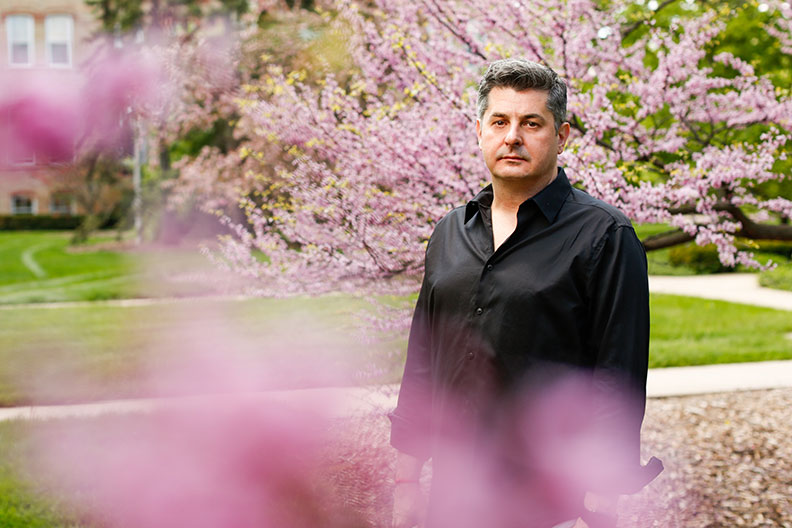Creating Critical Thinkers
Mladen Turk wants students to seek answers in both ancient ideas and new perspectives.
 Whether in an Elmhurst University classroom or a village in India “on the margins of the margins of the margins,” Mladen Turk continually introduces students to different ideas, experiences and ways of thinking.
Whether in an Elmhurst University classroom or a village in India “on the margins of the margins of the margins,” Mladen Turk continually introduces students to different ideas, experiences and ways of thinking.
He wants his students to grow as critical thinkers, “to expand their ability to make up their own mind” by acquiring the knowledge to examine questions from every angle. And, when they find answers, to explore the new questions those answers raise.
A professor of religious studies and chair of that department, as well as assistant director of the Honors Program, Turk has taught at Elmhurst for 15 years. His area of specialization is religion and science, and he teaches courses on the history of Christianity in the 19th and 20th centuries and the religious traditions of South Asia.
“When I present ideas to my students, they begin to see religious traditions not as a repository of clear-cut answers that they can simply internalize and make their own, but as a huge repository of questions that we still have,” he says, “and today we still have to come up with our own answers.”
So he is delighted when students seek him out after class to continue a discussion.
“What we talked about in class stayed with them, and then they read more, find more examples, and begin to craft their own way of thinking, their own ethos,” he says. “Those answers are not necessarily finite—it’s an ongoing process—but to see students start to work through that is absolutely fascinating.”
The students who take his study away course, Religions and Peoples of India, are especially open to thinking beyond the familiar, he says. Over 26 days, the group visits popular destinations like New Delhi and the Taj Mahal. But they spend more time interacting with Indian students and faculty at Madras Christian College in Chennai, or tagging along with social workers to remote rural villages where tourists never go.
The interweaving of ancient and modern is astonishing, even for travelers like Turk who have been visiting India for years.
“Some of its antiquities—the temples, the marketplaces—are right in front of you, alive and well, functioning in the same way that they have for at least 2,000 years,” he says. “Yet India also is a very new, dynamic, modern society. It’s changing so rapidly that even when I go every year, I find some areas in big cities that are completely unrecognizable.”
Students describe the course as life-changing, and say that at the very least it gave them a deeper understanding of themselves and their own culture.
“They come back home and realize there are things we do here that they always took for granted, things that other people do differently. That understanding is very valuable,” Turk says. “Gaining distance from something enables you to see things more critically, and by that I mean from another position, another point of view.”
Learn More About the Honors Program at Elmhurst
Posted Aug. 7, 2019